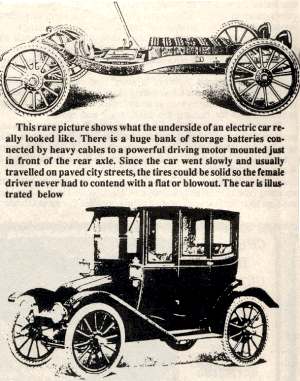

Some of the first automobiles were internal combustion gasoline, steam and electric. Ever wonder why two of those pretty much disappeared?
Posted on 09/28/2012 11:13:48 PM PDT by neverdem
Scientists with a common goal, to figure out an alternative to the lithium ion battery, the main power source of choice, are not giving up. The quarrel is not with the lithium ion battery's performance but in its high price and looming scarcity. The objective is to be able to offer a realistic alternative to lithium ion batteries for energy storage. Numerous recipes are coming out of labs as research efforts continue. The latest team to make news in this effort is from Japan, which relies on imports for its entire supply of the rare metal lithium. The news-makers are a research group at the Tokyo University of Science, led by Associate Professor Shinichi Komaba. They have confirmed they are making progress with their focus on sodium ion batteries as a li-ion alternative.
They are developing the positive and negative electrode materials for sodium-ion batteries using sodium ions as the cathode and carbon from ordinary sugar for the anode.
"Actually, we've spent about seven years researching sodium ion batteries. We've gained a lot of know-how regarding electrolytes and cells for such batteries. We have all the reagents needed right here," he said.
"Sodium ion batteries can be made using iron, aluminum, and sodium, rather than cobalt or copper as before," added Prof. Komaba. "What's more, our results show that battery capacity can be increased simply by using carbon made from sugar as the anode. So high-performance batteries like expensive lithium batteries, which are an important type of rechargeable battery, may be achievable."
They are using hard carbon obtained by pyrolyzing sucrose, the main constituent of sugar. Before it can be used as the anode in a sodium-ion battery, the sugar is turned into black, hard carbon powder by heating it in an oxygen-free oven, hot enough to produce a hard black carbon powder. The team has achieved a storage capacity of 300 mAh, which is 20 percent higher than that of conventional hard carbon.
Komaba anticipates it may take about five years to achieve a practical version, but the group is confident that this is possible. They have said that with improvements in technology and performance, it is reasonable to expect batteries that can replace lithium ion batteries with lower-priced materials that are abundant, not scarce. Other researchers beyond Japan are also interested in seeing to what extent they can progress using sodium ion technologies to the point where sodium ion batteries can be commercialized.
Argonne National Laboratory has been exploring sodium ion batteries as an alternative to lithium. Aquion Energy creates batteries that can operate at a wide range of temperatures and use sodium ions rather than lithium ions. The company has a production plant in Pittsburgh, Pennsylvania, and plans to create a high-volume production facility in the future. Sodium-based batteries are seen as an attractive path to follow as a cheap and nontoxic alternative.


Some of the first automobiles were internal combustion gasoline, steam and electric. Ever wonder why two of those pretty much disappeared?
Open Season on Salt: What the Science on Hypertension Really Shows
Biodegradable electronics here today, gone tomorrow
Some women actually have men on the brain
FReepmail me if you want on or off my health and science ping list.
Rechargeable batteries have a lot more applications than just transportation.

If they can produce their carbon from sugar I would think they could also produce it from pure cellulose aka cotton much cheaper.
Ah, I have one sweet and souwl battelly prease.
- From the article
At 20 mg lithium per kg of Earth's crust, lithium is the 25th most abundant element. Nickel and lead have about the same abundance.
- Wikipedia
Processing and purifying lithium might be more expensive than refining nickel and lead, but lithium is as common, so I hardly think that one should talk about its "looming scarcity."
Regards,
At 20 mg lithium per kg of Earth's crust, lithium is the 25th most abundant element. Nickel and lead have about the same abundance.
- Wikipedia
Processing and purifying lithium might be more expensive than refining nickel and lead, but lithium is as common, so I hardly think that one should talk about its "looming scarcity."
Bolivia is ruled by a socialismo, Evo Morales, IIRC. Accessibility and chemistry are key. Look at the periodic table of the elements.

Sodium, Na, sits just below lithium, Li, in the leftmost colomn. All of those elements in that column behave similarly as far as chemistry goes.
Sheesh - stop telling them this stuff! This is not new (when I was in high school 4+ decades ago, pyrolysis of sugar was one of my preferred methods of creating quite pure carbon for experiments) but if they stop remembering these things, we will be able to eat and live more cheaply!
First we have them turning our corn into alcohol so as to burn it in cars, etc. That has been a major factor in increasing the cost of corn from $2.25/bu in 2007 to over $7.50/bu today - more than thrice!
Now they are going to use use up our sugar to make batteries, and drive up the cost of sugar!
And you are suggesting that they instead use up our cotton and raise the cost of that!
What do you want me to wear now? Or are you expecting me to go naked - just so we can leave our gas and oil in the ground?
It’s all mixed together nowdays anyway. Everything you eat is made out of corn or soybeans one way or another. Animal feed is created out of components that are derived from distillates of corn. The starch is extracted from corn and various amino acids are created from it. These amino acids are fed to chickens and hogs in the indoor hog and poultry confinements. The cellulose is fed to cattle.
Corn and soybeans are basically petroleum combined with soil, water, and sunlight. Herbicides, pesticides, fertilizers are produced from petroleum. Petroleum fuel gets the seed in the ground. Petroleum fuel gets the water distributed on the growing seeds in the proper amounts. Petroleum fuel gets the crop out of the fields. Petroleum gets the crops to market. Petroleum fuel cooks the food. Petroleum products package the food. Petroleum fuel refrigerates the food.
The next phase will be to eliminate the animals from the chain of events. Animals proteins and lipids will be synthesized directly from the crops. Cellulose will be converted to protein via an artificial ruminate gut.
LOL
Wonderful reducto ad absurdum.
I actually don’t think high food prices are a bad thing for america. OPEC artificially inflates the value of oil. Why shouldn’t we retaliate by artificially inflating the value of crops? The best scenario would be if we could jack up the price of crops while simultaneously causing the price of oil to plummet...all during widespread civil unrest throughout the middle east.
Disclaimer: Opinions posted on Free Republic are those of the individual posters and do not necessarily represent the opinion of Free Republic or its management. All materials posted herein are protected by copyright law and the exemption for fair use of copyrighted works.